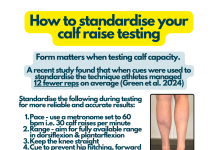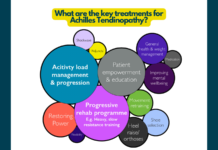Our articles are not designed to replace medical advice. If you have an injury we recommend seeing a qualified health professional. To book an appointment with Tom Goom (AKA ‘The Running Physio’) visit our clinic page. We offer both in-person assessments and online consultations.
When we talk tendons we usually focus on load so it’s refreshing when emerging research opens up potential new treatment directions. One such area is nutrition in tendinopathy and the role of gelatin supplementation. Today Brighton based Nutritionist Fran Taylor joins us to discuss this and explore some of the diet options to consider. Follow Fran on Twitter: @TheBrightonNut1 and on Instagram: TheBrightonNutritionist and check out her website.
Tendinopathies are a common occurrence among runners accounting for a large percentage of injuries. Having a sound physiotherapy plan is a good place to start, but what else? Can nutritional interventions help speed up the recovery process?
You’ll be pleased to hear that there’s a newly emerging treatment that has shown to increase collagen synthesis which may enhance injury recovery.
Tendons are made up of 85% collagen which is largely formed of two amino acids, proline and glycine. On a basic level having a diet rich in these amino acids may help. One source is gelatin which is rich in the amino acid glycine. With this in mind, a recent study1 trialled intermittent exercise with a vitamin C enriched gelatin supplement. This double-blind placebo-controlled trial the gold standard of testing showed that with a 15g dose of gelatin there was a two-fold greater increase in collagen synthesis compared with intermittent exercise on its own.
For an injured runner, this could mean that a dose an hour before a rehab session could shorten the timeframe between rest and getting back in the game. Whilst this study was based on a small number of participants and more research is needed to establish optimal dose and duration of gelatin supplementation it still shows promise.
However before you go inhaling gelatin-rich jelly babies with wild abandon (soybeans, chicken and cheese are other slightly healthier alternatives), there are other things you can include in your diet which can help the injury recovery process.
- Include leucine-rich protein sources. Leucine is a key amino acid to include in your diet. It’s the only one known to directly stimulate muscle cell growth and repair, and it’s also been shown to directly stimulate tendon formation. Good sources include lentils, tuna, cod, cottage cheese, almonds, milk and whey protein.
- Add some dietary nitrates. One of the features of tendons, and the reason they can be such an annoying ongoing injury, is that blood flow to the tendon can be pretty poor, resulting in difficulties supplying adequate nutrients to the area. Increasing the number of dietary nitrates in your diet (beetroot, spinach, rocket and celery are all good sources) can positively influence the amount of nitric oxide in your blood, which is shown to help increase blood flow through the capillaries, by relaxing and widening the capillaries.
- Build-in omega 3 food sources into your diet. Oily fish, flaxseed, chia seed, rapeseed oil, and walnuts are all good sources of omega 3 oils and this has a positive effect on the inflammation process. Additionally, inflammation of the tendons have been shown to respond well to omega 3 supplementation (1-2g/day). Always seek advice from a registered nutritionist before taking supplements.
So combining physiotherapy with a sound nutrition plan helps speed up the injury process, not only through the foods you choose to eat, but also perhaps mentally by knowing that you are taking some more control and doing all you can to get back out on the road.
For more from Fran read this interesting piece on the role of rehab nutrition for ultra running legend Dan Lawson.
1: Shaw, Greg. Lee-Barthel, Ann. Ross, Megan. Baar K. Vitamin C-enriched gelatin supplementation before intermittent activity augments collagen synthesis. American Journcal of Clinical Nutrition [Internet]. 2016;105(1). Available from: https://www.researchgate.net/publication/310471896_Vitamin_C- enriched_gelatin_supplementation_before_intermittent_activity_augments_collagen_synthesis









